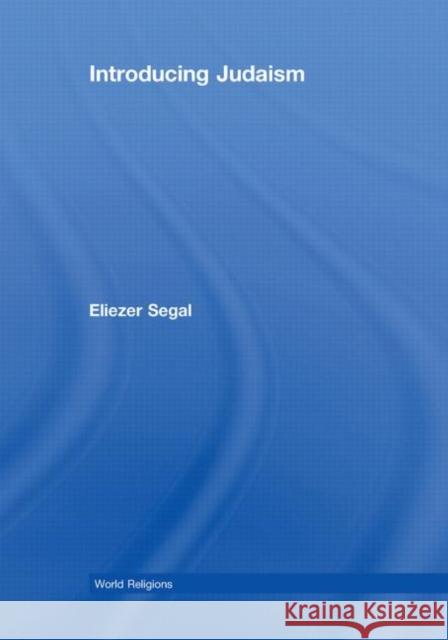Introducing Judaism » książka
Introducing Judaism
ISBN-13: 9780415440080 / Angielski / Twarda / 2008 / 346 str.
Introducing Judaism
ISBN-13: 9780415440080 / Angielski / Twarda / 2008 / 346 str.
(netto: 723,00 VAT: 5%)
Najniższa cena z 30 dni: 680,04
ok. 22 dni roboczych.
Darmowa dostawa!
Introducing Judaism is the ideal starting point for students beginning their studies of this fascinating religion. Eliezer Segal takes a historical approach, focusing on religious aspects of Judaism, and introducing themes as they emerge from authentic Jewish documents. Students will gain an understanding of how Judaism is lived by its adherents and the historical and geographical diversity of Jewish beliefs and practices. The book has a clear and accessible structure. Part One presents the historical context of Judaism, from the Biblical era, through the Medieval period and on to modern Judaism. Part Two surveys the distinctive values and beliefs of Judaism, including attitudes to God, Covenant, Israel, exile and homeland, the Torah, and its commandments, while Part Three presents Jewish Practices and Institutions, engaging with topics such as daily life, worship, temple and synagogue, law, ethics and education, the afterlife, and resurrection. Throughout the book, Eliezer Segal stresses the diversity of interpretations that have been generated by historical circumstances, differing theological and ideological outlooks, and the spiritual creativity of the religious community. Attention is paid to various models of piety, mysticism, scholasticism and folk religion, including the impact of Judaism on the daily life of believers and the experiences of Jewish women. Illustrated throughout, Introducing Judaism includes text boxes, a glossary, and a list of further reading to aid students' understanding and revision, providing a thorough overview of one of the first recorded monotheistic faiths and one of the oldest religions still practiced today. The accompanying website for this book can be found at www.routledge.com/textbooks/9780415440097.
Introducing Judaism is the ideal starting point for students beginning their studies of this fascinating religion. Eliezer Segal takes a historical approach, focusing on religious aspects of Judaism, and introducing themes as they emerge from authentic Jewish documents. Students will gain an understanding of how Judaism is lived by its adherents and the historical and geographical diversity of Jewish beliefs and practices.
The book is divided into parts, giving it a clear and accessible structure. Part One presents the historical context of Judaism, from the Biblical Era, through the Medieval period and on to Modern Judaism. Part Two surveys the distinctive values and beliefs of Judaism, including attitudes to God, Covenant, Israel, exile and homeland, the Torah and its commandments, while Part Three presents Jewish Practices and Institutions, engaging with topics such as daily life, worship, temple and synagogue, law, ethics and education, the afterlife and resurrection.
Throughout the book, Segal stresses the diversity of interpretations that have been generated by historical circumstances, differing theological and ideological outlooks, and the spiritual creativity of the religious community. Attention is paid to various models of piety, mysticism, scholasticism and folk religion, including the impact of Judaism on the daily life of believers and the experiences of Jewish women.
Illustrated throughout, Introducing Judaism includes text boxes, a glossary, and a list of further reading to aid students’ understanding and revision, providing a thorough overview of one of the first recorded monotheistic faiths and one of the oldest religions still practiced today.
Eliezer Segal is Professor of Western Religions at the University of Calgary, USA.











